The Chatham Arts Council is investing in artists through our Meet This Artist series, introducing you to 12 Chatham County artists each year in a big way. The fine folks at Hobbs Architects in downtown Pittsboro are powering our Meet This Artist series this year. Architecture is art, and the Hobbs crew values art in our community. So, take a look. Meet your very inspiring neighbors. Meet Chatham County Schools Superintendent Dr. Anthony D. Jackson, a life-long music-lover and advocate for the arts.
Back to school! Back to school! Fall is an exciting (and intense!) time for educators, families, and of course, the young minds shuffling back to the classroom to begin a new year of exploration and growth. In the center of the hustle and bustle is Chatham County Schools Superintendent Dr. Anthony D. Jackson, who, after a decades-long career in public education, effectively “leads from the front.” Dr. Jackson exemplifies the courage, compassion, and care necessary to guide children through youth into adulthood, and his example sets a high standard for everyone who shares that mission.
He’s also a long-time singer, music-lover, and arts advocate, and his background gives him a unique perspective on the profound impact the arts can have on a person’s life. Come and meet this artist, as he discusses the crucial role the arts have played in his own life, as well as his goal to bring arts access and education to the next generation.
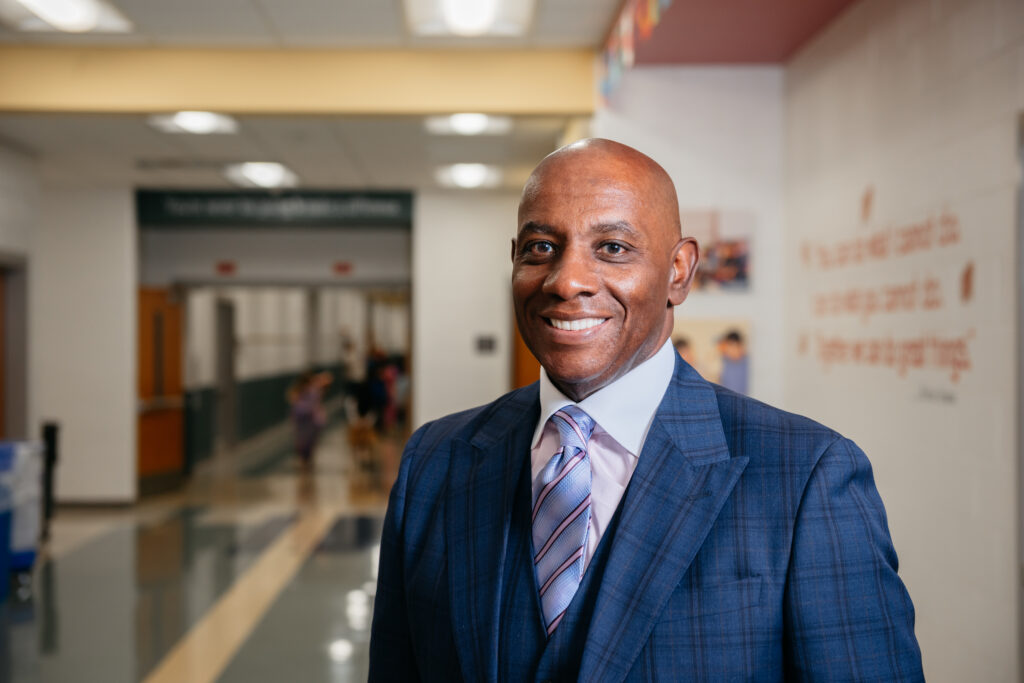
Dr. Jackson, how did the arts enter your life? What age were you?
The arts didn’t just enter my life; the arts actually saved my life. That’s my story. I was a small kid. I remember vividly a third grade teacher, Mrs. Burke. Back then, in the old days, you would have what was called May Day, this big celebration of spring. They needed someone to sing the solo for “The Candy Man.” Ms. Burke just pointed at me, and I don’t know where it came from, but I sang the solo to “The Candy Man.” That was not the defining moment, but I go back to it, as that’s probably the first time I ever sang by myself.
As I grew, school was not a fun place for me. School was not a place that I enjoyed until I got to junior high school. I was in the halls one day, getting into trouble. I was out there singing at the top of my voice, a Stevie Wonder song, “Ma Cherie Amour,” and Mrs. Jackson comes down the hall (she’s no relation). She pulls me into her classroom, and she gives me the business! And then she says, “You come and see me in the morning.” So I went and saw her the next morning, not knowing that she had gone to my house and met with my mom. They had concocted this plan, and I was placed in the boys glee club.
The next day, my schedule was changed. That became the transformative moment for me, going into that boys glee club and actually hearing harmony. I remember going, “This is cool!” and “Oh, I can do that.” And I realized very quickly that this was something that I really, really enjoyed. And so school became a whole different place.
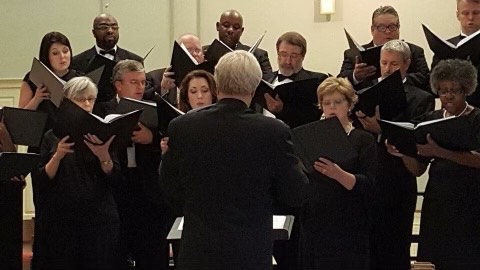
Now, why do I say it saved my life? It was simply because I was hanging out with some kids that I probably shouldn’t have been hanging out with. Music replaced, filled that time that I was over there spending with them. Now I was rehearsing and getting ready for plays. As a result, it pointed me in the right direction and probably changed my whole life’s trajectory.
Was it after school then?
It was during school. But, as you know, during school became after school.
They connected me with the Duke Ellington School of the Arts in Washington, DC. Edward Jackson Jr. was the music director at the Duke Ellington School. My music teacher with the boys glee club, she brought him in one day to just hear us sing. And he heard me over all of them–not that I was trying to out-sing them–but he heard me sing and said, “You’re that kid!” He took me under his wing, and the rest is history. He exposed me to Italian art songs and opera and jazz and all kinds of different harmonies. We got to sing at the Kennedy Center. We traveled to Mexico, just because of that interaction.
What voice part?
I’m a tenor. First tenor, but I don’t get to sing much anymore.
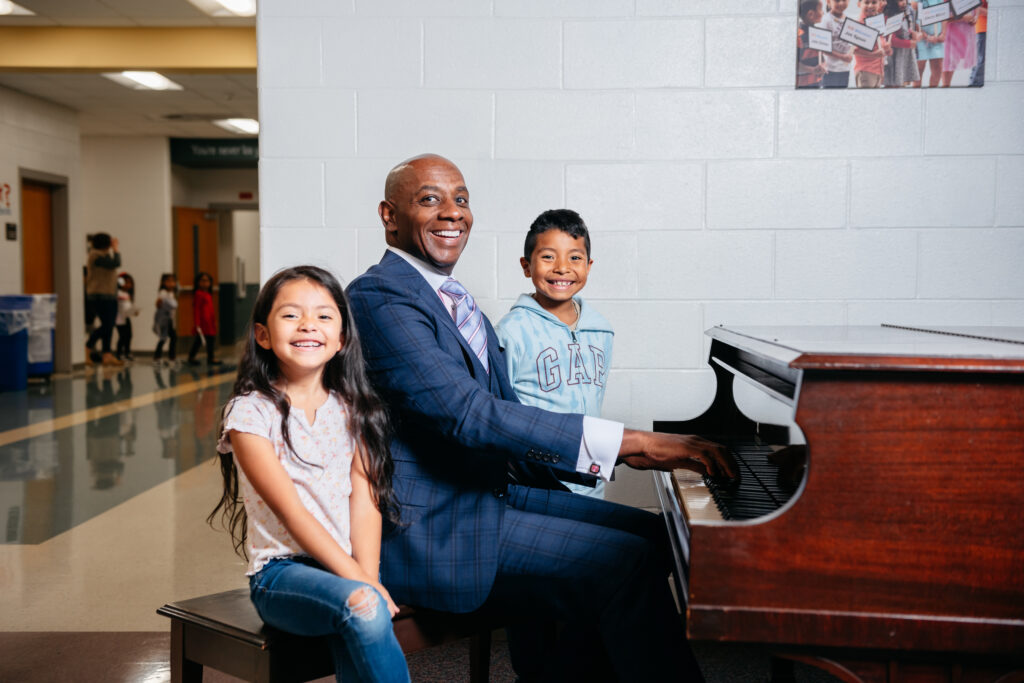
What do you believe an arts education provides students?
I grew to become a musician and an artist, and to recognize how important the arts were. It wasn’t until later that I realized the arts had opened so many doors for me. The arts helped with other subjects. I remember math was so very hard for me, but once I figured out that reading music was nothing but fractions, I was like, “Oh, that’s it.” I understood math. I understood science. I understood social studies. Music opened that door for me. I realized that when we were talking about characterization and tone, those are the same things we were talking about with literature. When we were talking about balance and timbre and things like that, it’s the same thing we were talking about with sound waves in science. So music, for me, opened all the doors. I think music is the gateway for a lot of kids, whether it’s band or chorus. I like to believe, and I often say to our students, music is the true laboratory for us to demonstrate all the things that we think we know.
So whether it’s dance, band, chorus, or fine arts, you get to see all of those things that we try to teach kids through traditional content. Sometimes things like the quadratic equation make no sense until you see it in a sculpture or similar visual form. I remember Columbine, and how deeply that had affected our country, but it was through music that we were able to help children heal and understand what was going on. Even as a teacher, it was so very important to me that my space became this portal for kids to go from what they were taught to how they would live. And the arts became the vehicle to get them there.
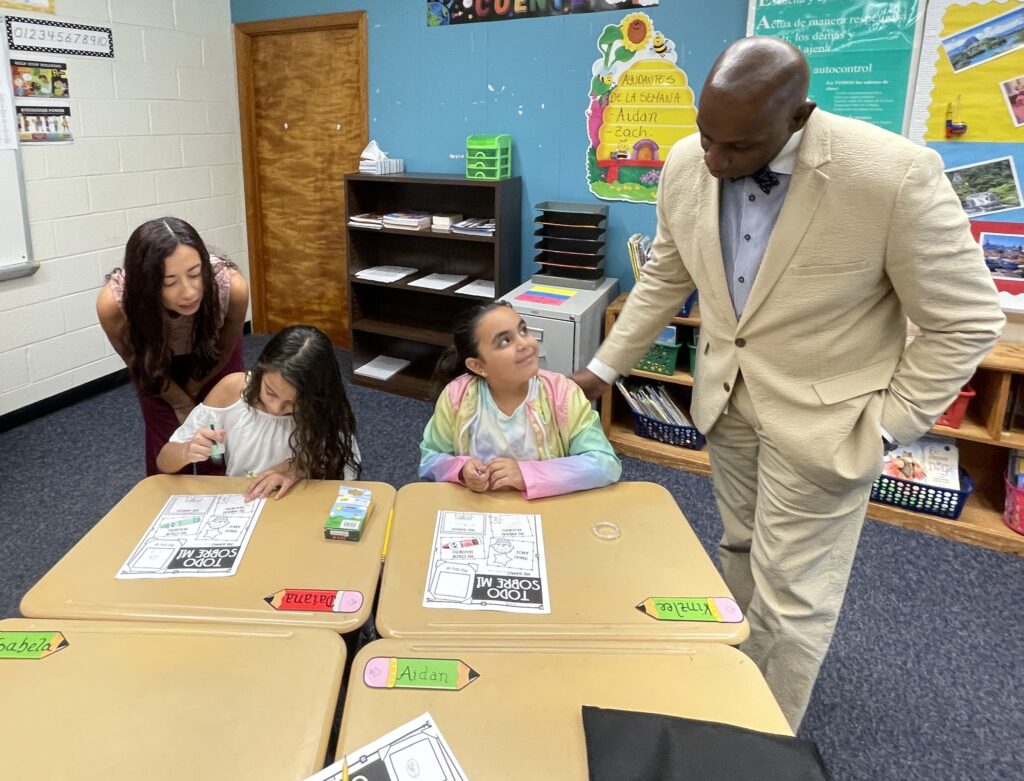
The arts reach us on a very natural, emotional level, which opens people up to learning.
Think about how we teach kids. I remember the light going off for me and realizing, “Wait a minute. What’s the first thing we do for a child? How do we teach children? Music.”
Absolutely. My three-year-old is learning Spanish through song, mostly.
My kids, we had car songs. We had a song to go to bed. We had a song to get up, go to preschool. We had a routine. So music is a part of our DNA and structure. One of the things that really bothered me when I was a teacher: I would hear people say, “Well, I’m not a singer. I can’t sing. I can’t carry a note in a bucket.” And then I would always say, “Well, carry it in a cup.” Just carry it! Because music is in you. It’s your voice. It’s always there. Yeah, everybody, you have a voice.
Your work keeps you quite busy, so you don’t have time to sing as much anymore. But we all listen to music. Who are your favorite artists to listen to? Who do you enjoy?
I’m pretty eclectic. I can go from Jay-Z to Bruno Mars to Brahms within an hour. So you’ll come in here some days, and I’m listening to Coltrane. And then you’ll come back later on, and I’m listening to Chopin. And you’ll come back later, and I’m listening to Vivaldi’s “Gloria,” or Billie Holiday. So I’m pretty eclectic. It just speaks to me. When I get in my car, I typically just turn the music on. I listen to this station called Watercolors, and I just kind of … It’s just my happy place. It’s where I can think. And I used to tell people: It’s where I can breathe.
I enjoy going to live performances. I attend performances here regularly. I go to as many concerts here as I go to football games. I’m at the play. I’m at the band concert. I’m at the dance recital. I’m at the small ensemble concert. I’m over there at the art exhibit. I really want to model for kids that there is a pathway for you, if you would just commit. We don’t have a problem in the world asking kids to commit to the athletic field. We tell them, “Commit to it, and you might go all the way to the pros!” We don’t have a problem in the world telling kids to commit to academic endeavors. “You can be a straight A student!” But for whatever reason, we make the arts this thing that, “Oh, you can just do it whenever” as opposed to, “If you commit to it, it can change your life.”
I completely agree. No matter what field of work one ends up going into.
My son’s a perfect example. My son was a string bass player in the orchestra. He got a full scholarship to Old Dominion University to play in the orchestra his whole four years. He majored in communications, and he’s now a technology company executive, but he still plays in the symphony.
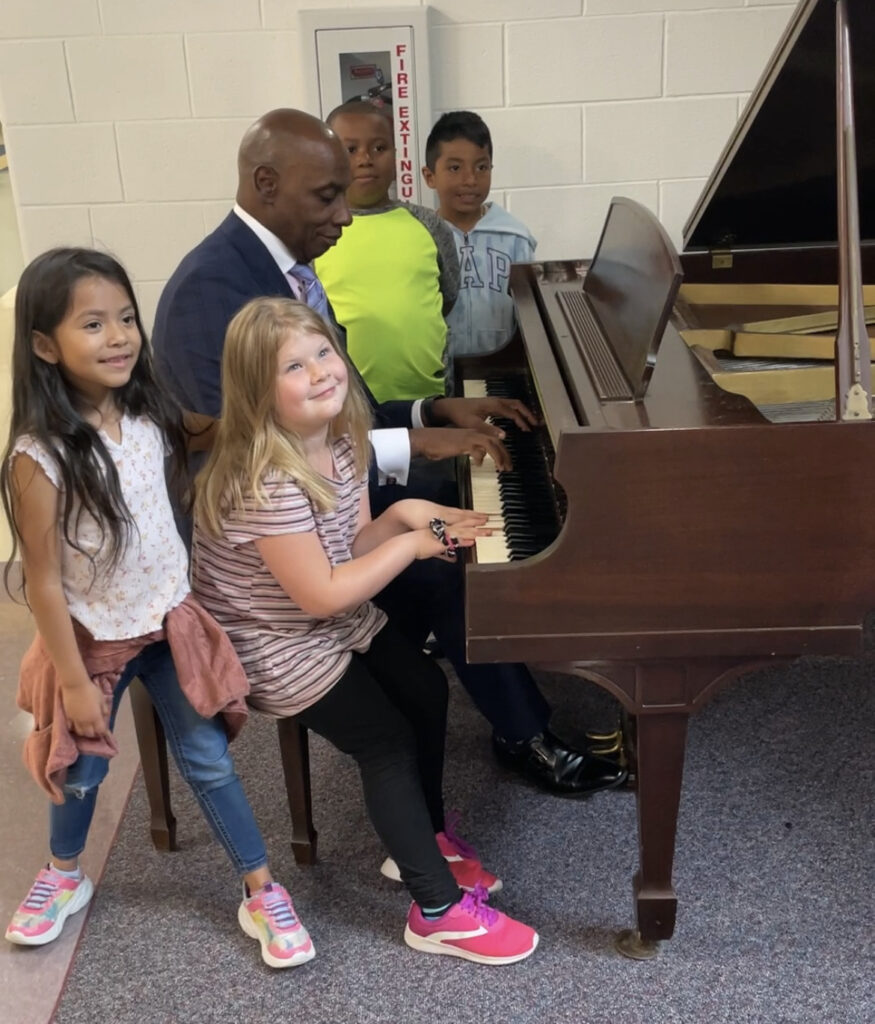
In Chatham, one of the things that I really hope we can do here is give every single student the opportunity to live out whatever their hopes and dreams are. We’ve chosen to pursue three pathways: the arts, academics, and athletics. Every single child should be able to either be on that stage, on that field, or in that classroom and hit a home run or sing a high note. Some kids are lucky enough to do it in two areas. Some kids are brilliant enough to do it in three, but every kid should be able to find their pathway in one. And that’s what we’re going to do here. That’s what I advocate for. That’s what I push for.
That’s so heartening.
People accuse me of being partial to the arts. Imagine! And I may be, but I am bullish on the next generation. I’m going to do whatever’s necessary so that all of those kids can have whatever their dreams are. We have to have a next generation of kids who understand respect and can create beauty. And I think that’s what’s missing right now. That’s where kindness is planted. That’s where empathy is planted. That’s where love is planted. Not every kid’s going to be a straight A kid, but every kid can be kind. Every kid can be loving, every kid can be caring, every kid can be empathetic, if we would just till the soil enough to let them do it.

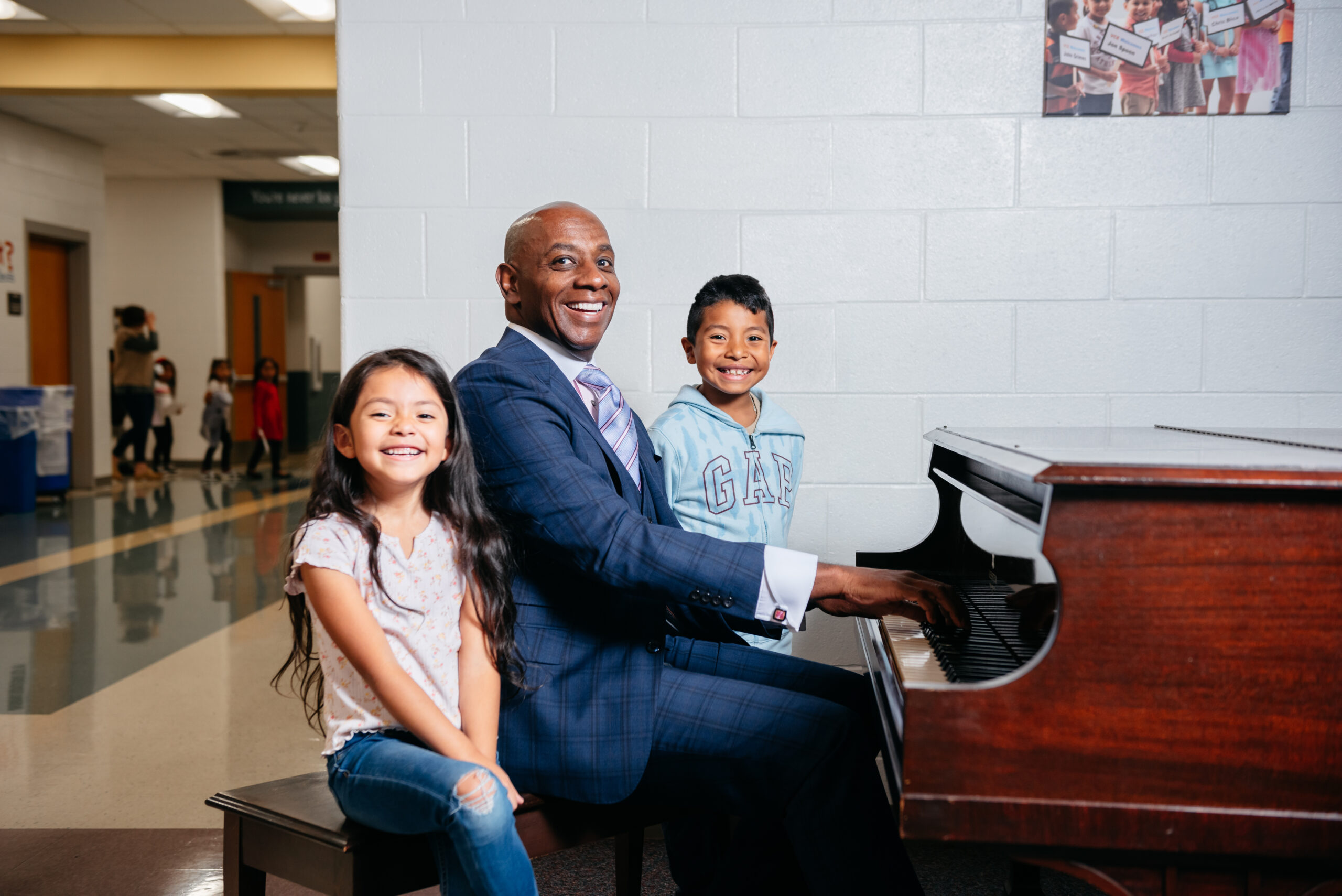
Glad to see you are still smiling with students and creating aspiring artists!! You inspired me as an art educator in Virginia.
Thank you!
-Vick